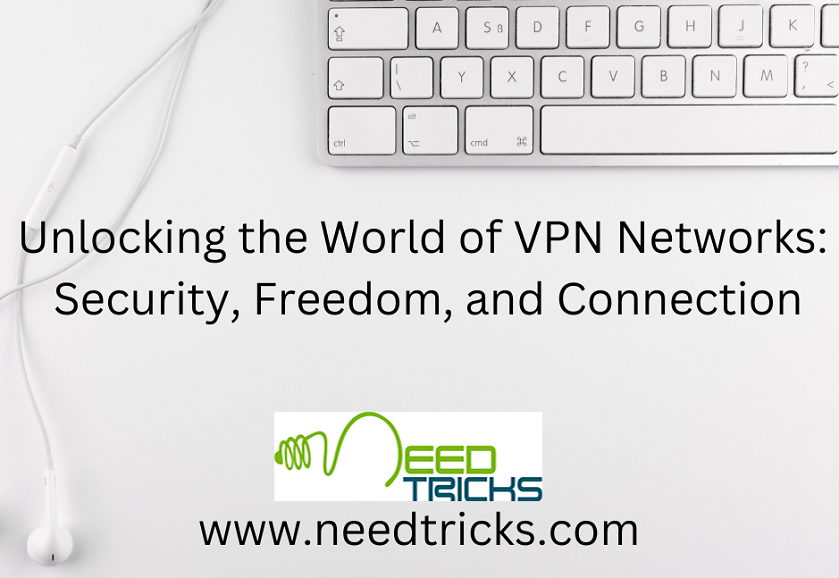In our increasingly digital world, the concept of a VPN network (VPN Networks), or Virtual Private Network, has become an integral part of our online experience. VPNs offer a secure and versatile solution for a variety of purposes, from enhancing online security and privacy to bypassing geo-restrictions and enabling remote access to local networks.
In this comprehensive guide, we’ll explore the world of VPN networks, shedding light on how they work, their importance in our digital lives, and how you can use them effectively on various devices and platforms.
Unlocking the World of VPN Networks: Security, Freedom, and Connection
Understanding VPN Networks:
A VPN network is a technology that enables secure and encrypted connections over the internet. It works by creating a private network connection over a public network, such as the internet.
This private network connection is often referred to as a “tunnel.” When you connect to a VPN, your internet traffic is routed through this tunnel, making it secure and private.
Here are the key aspects of VPN networks:
- Encryption: VPNs use encryption to protect your data from being intercepted by third parties. This encryption ensures that even if someone intercepts your internet traffic, they won’t be able to decipher it without the encryption key.
- IP Masking: VPNs hide your real IP address and assign you a different one from the VPN server’s location. This helps protect your identity and location online, enhancing your privacy.
- Bypassing Geo-Restrictions: VPNs can be used to access content that is geo-restricted. By connecting to a server in a different location, you can appear as if you’re browsing from that region and access content that may be blocked in your location.
- Enhanced Security: VPNs add an extra layer of security when you’re using public Wi-Fi networks, making it difficult for cybercriminals to intercept your data.
- Remote Access: VPNs allow remote users to securely connect to a local network, making them valuable for businesses with remote employees or individuals who need access to their home network while traveling.
Types of VPN Networks:
There are several types of VPN networks, each designed for specific use cases. The most common types include:
- Remote Access VPN: These VPNs are designed to allow remote users to connect securely to a corporate or home network. They are often used by businesses to provide employees with access to internal resources from outside the office.
- Site-to-Site VPN: Site-to-site VPNs are used to connect multiple local networks (e.g., branch offices) over the internet. This type of VPN enables secure communication between geographically dispersed locations.
- SSL/ TLS VPN: SSL (Secure Sockets Layer) and TLS (Transport Layer Security) VPNs are often used for secure remote access to web applications. They are commonly used for accessing email or web-based services securely.
- PPTP VPN: Point-to-Point Tunneling Protocol (PPTP) is an older VPN protocol known for its ease of setup. However, it is considered less secure than other protocols and is not recommended for sensitive data.
- L2TP/ IPsec VPN: Layer 2 Tunneling Protocol (L2TP) with IPsec (Internet Protocol Security) is a more secure option for remote access. It offers strong encryption and authentication.
- OpenVPN: OpenVPN is an open-source VPN protocol known for its high level of security and flexibility. It can be used on various platforms and is often the preferred choice for privacy-conscious users.
Why Use a VPN Network?
The importance of VPN networks in our digital lives cannot be overstated. Here are some compelling reasons why individuals and businesses use VPNs:
- Enhanced Security: VPNs provide a secure and encrypted connection, making it difficult for hackers and cybercriminals to intercept your data.
- Privacy Protection: VPNs mask your IP address and prevent websites and advertisers from tracking your online activities. Your online identity and location remain private.
- Access to Geo-Restricted Content: VPNs allow you to bypass geo-restrictions and access content that may be blocked or limited in your location. This includes streaming services, websites, and online services.
- Safe Public Wi-Fi Use: When using public Wi-Fi networks, such as those in coffee shops or airports, a VPN ensures that your data remains secure, protecting you from potential threats on unsecured networks.
- Remote Work and Access: For businesses, VPNs enable remote employees to securely access company resources and work from anywhere with an internet connection.
- Online Anonymity: VPNs provide a degree of anonymity online, as your true IP address is hidden. This can be important for users in regions with strict internet censorship and surveillance.
Using VPN Networks on Different Devices and Platforms:
Whether you’re using a laptop, smartphone, or desktop computer, VPN networks can be configured on various devices and platforms. Here’s how to set up a VPN connection on some common devices:
VPN Connection for Laptop (Windows):
- Open “Settings.
- Go to “Network & Internet
- Click on “VPN” in the left sidebar.
- Click “Add a VPN connection.”
- Enter the necessary VPN details (server address, connection type, etc.).
- Save your settings and connect to the VPN.
2. VPN Connection for Mac:
- Open “System Preferences.
- Go to “Network.
- Click the “+” button to add a new network connection.
- Choose “VPN” as the interface.
- Enter the VPN server address and authentication details.
- Click “Connect” to establish the VPN connection.
3. VPN Network for Android:
- Open “Settings.”
- Go to “Network & Internet” or “Connections.”
- Select “VPN” or “More Connection Settings.”
- Tap “Add VPN” or a similar option.
- Enter the VPN details provided by your VPN service.
- Save the settings and connect to the VPN.
Free vs. Paid VPN Networks:
There are both free and paid VPN services available, each with its own set of advantages and limitations. Here’s a brief comparison:
1. Free VPN Networks:
Advantages:
- No cost.
- Quick setup.
Limitations:
- Limited server locations.
- Slower speeds due to server congestion.
- Potential privacy concerns, as some free VPNs may log user data.
2. Paid VPN Networks:
Advantages:
- Wide selection of server locations.
- Faster speeds.
- Stronger encryption and security features.
- Customer support.
Limitations:
- Cost involved, usually through a subscription fee.
When choosing a VPN, consider your specific needs and priorities. Paid VPNs often provide a higher level of security, faster speeds, and better support, making them a worthwhile investment for many users.
VPN Network Security Considerations
While VPNs offer enhanced security and privacy, it’s important to be aware of potential security considerations:
- Choose a Reputable VPN Provider: Select a well-known and trusted VPN provider with a transparent privacy policy. Avoid using free VPN services that may compromise your privacy.
- Regularly Update Your VPN Software: Keep your VPN client up to date to benefit from the latest security patches and improvements.











